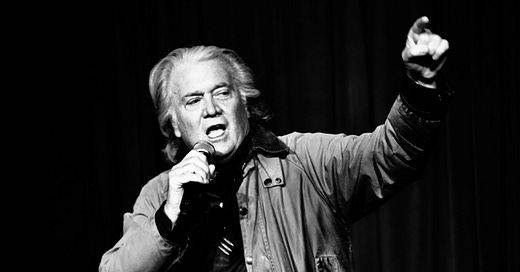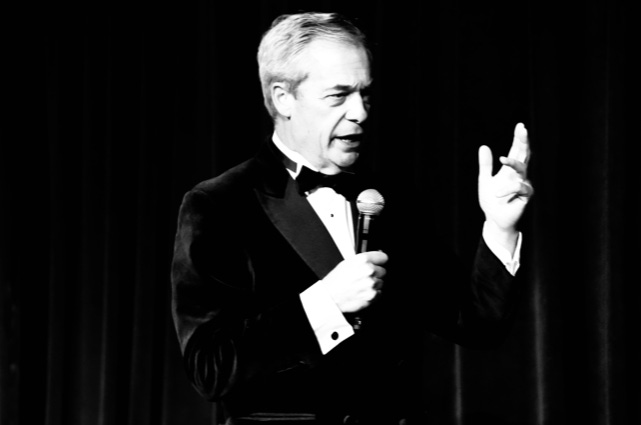Steve Bannon's Strong Man
At New York's Young Republican Gala, the allure of the strongman captivates a crowd of the international far-right.
Today’s essay was originally intended for publication at C*****t M******e, who pulled the submission for unclear reasons. But its argument is urgent and serious, so I’m publishing it here in full. The piece is the first instalment of a two-part series on the gala event. This one is an op-ed about strongman politics. The next will be a more descriptive, narrative report.
Consider Benito Mussolini’s arrival in Rome in 1922: a swaggering newspaperman turned political upstart, marching on the capital with little more than brute confidence. Italy’s conservative elites—tired, shaken, and desperate—looked at him like a handy wrench to tighten their old political machine. Instead, they got a template for the future strongman—someone who promised to bring order with a firm hand, sidestep consensus, and cast complexity aside.
By the early 1930s, the conditions Mussolini had seized upon—widespread economic hardship, fractured institutions, and a yawning legitimacy gap—had spread across the continent. In Germany, a debt-strapped nation drained of faith in its shaky democracy saw these pressures culminate in Adolf Hitler’s appointment as Chancellor. Meanwhile, in Greece, Hungary, and Norway, far-right groups emerged with varying ideologies and motivations. But the basic realities across these contexts were the same: Everyone spent too much money killing each other in the First World War, compounded by the influenza pandemic that killed millions and left Europe fractured. Trade and debt treaties locked in policies of austerity, and an American stock market crash sparked a global financial crisis, magnifying the already dire conditions. Hyperinflation in Germany is now infamous, but it was just one facet of a broader collapse in faith. In this climate—where treaties and parliaments looked feeble and unmoored—the market for a strongman emerged.
As I took in Steve Bannon’s performance before a crowd of Young Republicans at their recent New York gala, I found myself wondering whether his call for “more swag” was just another echo of the swagger Mussolini once made so compelling. After all, it was with a kind of confident ease that Bannon declared, “The fight starting January 20th,”—the day Trump would take office—“is going to be determined in this city. The bond market is going to determine whether we're successful or not.”
Citing Nigel Farage, the right-wing British MP who spoke only minutes before Bannon, he said that “more governments have been ‘turfed out’ by the bond markets than by Howitzers.” The global capital markets turfed out Liz Truss’s British government, Bannon said, and if they turf out Trump, he won’t be able to claw back the debt accumulated since the 2008 financial crash. “We need to have his back,” Bannon said, a message that targeted the financiers sitting in the opulent room. In four hundred days, the national debt will be $40 trillion dollars, Bannon said, citing data from the U.S. national debt clock. “Do you understand—at $40 trillion dollars, at $1.5 trillion of interest expenses—what that takes away from the country?”
While it might be wise to meet Bannon’s words with skepticism—particularly, since he’s known for using this napkin math to sell gold to podcast listeners—the problem he was addressing in the room is real and urgent. The world is bound far more tightly to American finance than it was in the 1930s, and today’s global economy is subject to shocks that transcend borders: proxy wars, a global pandemic, near-zero interest rates prolonged for over a decade, trade tensions, and energy crises. Inflation crises are already beginning to appear in places without the confidence of America’s financial class. And it’s not just in second or third-world countries. Britain, France, Canada, and even Germany are experiencing significant inflationary risk, exacerbated by trade disruptions and the American-led boycott on Russian gas. Suppose the Trump administration makes good on a former policy proposal to tariff imports at 20%. Suppose China succeeds in destabilizing the greenback. These risks will only increase if extreme climate events start to push more immigrants north—on both continents.
Consider setting aside Trump’s talk of punishing enemies or serving beyond his term limits; the overwrought analogies to Hitler say more about partisan alarmism than about the man himself.
But what has become apparent in our era of radicalism and austerity—the search for alternatives driven by a dearth of authority—is that the market for a strongman leader has returned, and even Bannon seems to think that things will get worse before they get better. “Okay, so we won,” Bannon said, “but the hard part is only starting.” “You have 15 million illegal alien invaders here on Biden's watch, and they all have to go.”
The gala’s guest list mirrored this shift in global temperature. Far-right delegations from Europe—including members of Germany’s AfD, the Netherlands’ Party for Freedom (PVV), and Hungary’s Fidesz—had come to celebrate and absorb lessons from the MAGA movement’s populist appeal. Like Mussolini’s heirs in the interwar years, these parties draw on economic grievances, cultural anxieties, and a hunger for decisive leadership. They ground themselves in economic populism, Christian values, opposition to the ‘woke’ left, and hardline anti-immigration policies. All of them are led by strongman leaders who think of themselves as “illiberal,” if not anti-democratic. All of them are cozying up to Trump, hoping to glean something from his skillful use of media, or there for the naked pursuit of currying favor. But it’s more than that, too. If America becomes isolationist again—if it pulls out of NATO, onshores manufacturing, and pursues a true energy autarky, as the Trump plan suggests we will do—global financial markets will go haywire, and the market for strongman leaders will boom.

But setting aside counterfactuals, it remains unclear whether Bannon’s laundry list of global issues is truly within the President’s capacity to resolve. Bannon himself acknowledged that “regardless of what President Trump and DOGE does right now, those numbers [the $40 trillion of debt] are almost baked in.” Climate change, mass migration, and the escalating energy demands from global computing are all multifaceted challenges that transcend the influence of any single administration. Just as Mussolini promised decisive action to restore Italy, Bannon’s vision places unwavering faith in a strongman’s ability to conquer systemic challenges, overlooking the inherent complexities and interconnectedness of today’s global landscape.
This dissonance is precisely where the appeal of the strongman leader enters. Faced with complex challenges and institutional failures, many are drawn to the fantasy that one man can turn the tides on a sinking ship with unwavering will and determination. The allure lies in the promise that by battening down the gates, punishing traitors, and evacuating internal enemies, the storied successes of yesteryear can return once again. You can right the wrongs of the past. Set the record straight and build it anew. You can Make America Great Again.
This narrative is precisely what Bannon professed to the crowd at the gala. Starting on inauguration day, he said, the Trump administration plans to pursue “investigations, trials, and then incarceration.” Together, we can “deconstruct the administrative state,” he said, because “the Democratic Party is finished…we've got these rats cornered.” “Think of how they tried to destroy every person in this audience,” Bannon said. Donald Trump has a “kind heart and big soul. But that’s not us, right? We want retribution.”
The reality, however, is that no amount of border control will bring back the American economy of the nineties. Stop migrants from entering now; the cost will show up later as global development setbacks. Reduce the footprint of America’s standing army and watch mercenary groups flower around the globe. Tax the corporations and watch them leave in droves. Fire public service workers and subject the public to corporate predation. Leave Ukraine and send a message that America breaks its commitments. Punish your enemies and create a police state. Impose tariffs on partners and watch them turn into enemies. Stop lending abroad and China eats your lunch.
The core problem—and we have many—is that the globe is now more interconnected than ever before. From the mesh of internet cables beneath the sea to airplanes dashing across the sky, what happens in one place is inseparable from what happens everywhere else. Media doesn’t respect borders, nor do pandemics or emissions, and no amount of nationalism can alter this reality. This interconnectedness was a driving force behind the creation of the EU and has thus far helped prevent nuclear disasters. Just as Mussolini’s authoritarian solutions ultimately proved inadequate for the complex challenges of his time, descending into nationalism or placing blind faith in any strongman leader will not save us today. As Mark Twain aptly noted, “history doesn’t repeat itself, but it often rhymes.”







This is a great article! If you wanted your reader to be left deeply worried, you succeeded 👏🏼
Sobering piece! The pendulum of politics has definitely swung right in response to overly woke politics of the Left. DEI lost it's way and the ensuing craziness that turned the world upside down bred the backlash we see openly being discussed at this conference. Somehow we need to find normalcy, moderation, civility, and compromise. I hope we find that soon.